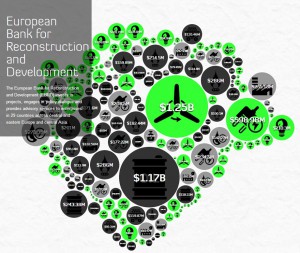
This week, two important actions were added to the growing list of recent global steps curbing public finance for coal. First, on December 10, the European Bank for Reconstruction and Development (EBRD) joined the World Bank and European Investment Bank (EIB) in adopting a new Energy Strategy that significantly restricts support for coal power projects. Under the EBRD’s new Energy Strategy, the Bank will support coal-fired generation only “in rare and exceptional circumstances in which there is no feasible alternative energy source.”
This decision by the EBRD will help to promote the shift to cleaner and more climate friendly power production in the Bank’s region of operations – the former Soviet Bloc countries, which are heavily dependent on fossil fuels. In recent years, the EBRD has provided over $220 million annually to support coal in the region.
As the second climate feat of the week, the U.S. government voted no on the Board of the Asian Development Bank (ADB) for a proposed coal power plant in Pakistan. However, even though the U.S. and several other countries voted no or abstained from supporting the Pakistan coal plant, the ADB board still had a simple majority, and therefore approved $900 million in funding for the 600 MW Jamshoro coal plant.
The no vote on the coal plant at the ADB by the United States clearly follows on President Obama’s Climate Action Plan, which aims to halt U.S. tax dollar support for overseas coal plants. Momentum is growing to stop coal finance in other countries as well, as the United Kingdom and Nordic countries have also recently announced steps to limit international coal financing.
These steps all deserve to be commended, but the fact still remains that the job is far from finished. Without further heightened action from the U.S. and other powerful actors the coal-curbing policies will have limited influence. As demonstrated in the case of the ADB, the U.S. and other countries need to go beyond simply voting no to stop their tax dollars from supporting coal. Unlike the World Bank and EBRD, the ADB does not have a policy restricting support for coal plants. Thus, the U.S. needs to step up and work hard to demonstrate to other ADB member countries, especially borrowing countries, that coal is not the answer and provide the necessary strategic assessments and financing of alternatives for affordable, clean energy for the poor. In other words, in order for the U.S. coal restrictions to be effective, the U.S. must build international support so that coal projects are not approved at the boards of development banks.
Furthermore, the development banks still support coal development through policy reforms and technical assistance. For example, the World Bank and ADB have combined provided over a billion dollars of assistance to develop government policies and institutions offering public support for coal development in Indonesia. The U.S. and other countries need to be comprehensive in their approach to make sure the banks are not supporting policies that provide incentives for coal.
In addition, although the development banks have begun to restrict support for coal, the banks still strongly support oil and gas projects, including exploration. Since 2008, the World Bank alone has provided close to a billion dollars in funding targeted at oil and gas exploration. Scientists agree that at least two thirds of the world’s already proven fossil fuel reserves cannot be burned if we are to avoid the worst impacts of climate change. If we cannot afford to burn what we already have, why are public funds supporting further exploration?
In the end, efforts to address climate change need to be comprehensive and vigilant. With regards to development banks – a coalition of developed and developing countries is needed; projects and policy reforms should be addressed; and financing must be stopped for all fossil fuel projects, and particularly exploration projects.
